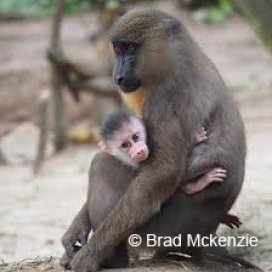Tuesday, June 16, 2015 – 4:37pm
Tchimpounga has undertaken the care and rehabilitation of a number of rescued mandrills. Mandrills are intelligent, social and one of the most colorful mammals in the world. Unfortunately, they are also endangered. Because of their beauty and docile nature, mandrills are often a target of poachers who take them from their forest homes and families only to sell them into the dangerous and illegal exotic pet market.
A large part of JGI’s work with mandrills is our Mandrill Release Program, a program which seeks to rehabilitate rescued mandrills and release them back into the forest where they belong. JGI has successfully released several of these mandrills into the Conkouati-Douli National Park in the Republic of Congo. This site was selected because the park is a protected area with active law enforcement. Once the mandrills are released, they are closely monitored by JGI staff to ensure that the group remains healthy. Each mandrill is also fitted with a radio collar for long-term tracking.
So far in 2015, the Mandrill Release Program has been very successful. Early in the year, five male mandrills were released into the forest to join the eight mandrills that were released previously. All five new mandrills eased their way into the established release group with little stress or hesitation, and the group is now a cohesive whole.
Perhaps one of the best signs that a release has been successful is when new babies are conceived and born to members of the group once they are in the wild. This is why JGI is very happy to announce that Mbote, one of the young adult females in the release group, has given birth!
Mbote’s infant is the second baby born in the wild from the release group in two years. This is a great achievement, and it lets us know that these mandrills, rescued from confinement and solitude, are thriving in their new found freedom.




